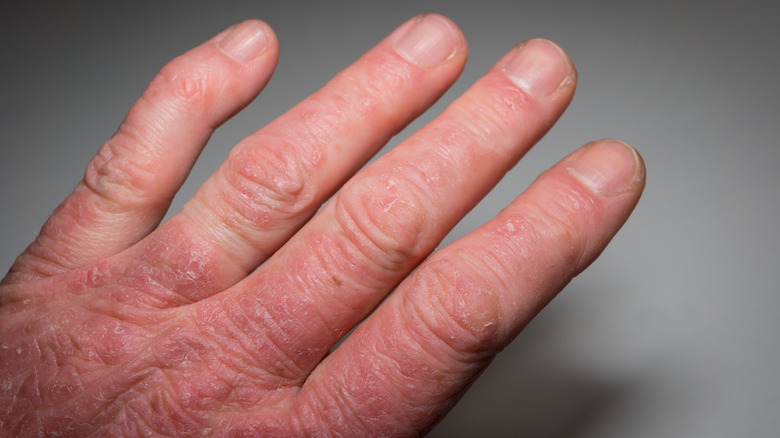How Does Psoriatic Arthritis Impact Your Heart?
Psoriatic arthritis is a type of arthritis that's related to the skin condition known as psoriasis. According to John Hopkins Medicine, psoriasis causes red patches on the skin or dents in fingernails or toenails. Up to 30% of people with psoriasis develop psoriatic arthritis. Typically, psoriasis appears years before arthritis develops, but it is possible for someone to experience arthritis first and psoriasis second, or both at the same time, per Mayo Clinic.
Psoriasis and psoriatic arthritis are chronic, meaning symptoms constantly recur, but there may be days when symptoms aren't as severe as other days. According to Mayo Clinic, symptoms of psoriatic arthritis include pain in the foot or lower back, swelling, changes to nails, and inflammation of the eye.
In people with psoriatic arthritis, the immune system attacks the body's healthy tissues and cells, and in turn, causes inflammation in the joints. Environmental factors and genetics may contribute to psoriatic arthritis, as specific genetic markers have been associated with the disease (via Mayo Clinic).
Psoriatic arthritis and the heart
It's important to see a doctor if you believe you may have psoriatic arthritis, as the disease can impact the heart. According to the Arthritis Foundation, people with psoriatic arthritis have a higher risk of developing heart disease and overall body inflammation. With heart disease, the innermost layer of blood vessels, or endothelium, is inflamed, meaning debris, fats, and more can build up in the blood vessels' walls, a process known as atherosclerosis. This can raise a person's blood pressure and decrease how much blood flow reaches the heart. Some of these fatty deposits, or plaques, can actually burst and cause a clot that may lead to a stroke or heart attack.
There are steps you can take to decrease your risk of developing heart disease. Versus Arthritis notes that exercising, lowering your alcohol intake, avoiding smoking, and eating a healthy diet low in fat, salt, and sugar are steps you follow to reduce your risk. Additionally, some of these steps can help a person lose weight, lowering the risk of heart disease as well.


